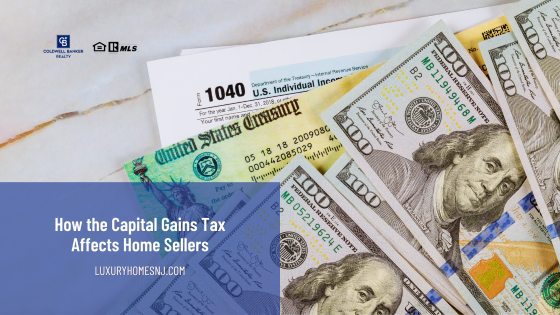You sold your Westfield area home this year. You also earned a nice profit from your sale. Congratulations! But, come April 15th, you may end up owing some money because of what you made from your home sale. That is called the Capital Gains Tax. However, there are a few ways you can reduce and sometimes even eliminate this tax.
How the Capital Gains Tax Affects Home Sellers
What are Capital Gains?
First of all, it helps to know what capital gains mean. In real estate, the difference between what you paid for your luxury NJ home when you initially bought it and what you received when you sold it is called “capital gains”. For example, you paid $800,000 for your property a few years ago. You sold it for $1,350,000 this year. you received $550,000 in capital gains. Uncle Sam considers this income, therefore, taxable.
How to Reduce Your Capital Gains Tax
Fortunately, the government also put conditions in place that help reduce your capital gains tax. If you used your home as your primary residence for at least two of the previous five years, you may claim an exemption. For married couples who file jointly, the first $500,000 in capital gains may be claimed tax-free. For individuals or married persons filing separately, the first $250,000 in capital gains may be claimed tax-free. So, using the example above, married couples filing jointly only pay tax on the $50,000 not covered by the exemption ($550,000 capital gains – $500,000 exemption = $50,000). For individuals and married couples filing separately, you pay taxes on the $300,000 not included in the exemption. If you bought your home less than two years before you sold it, you might be able to claim a partial exemption. Discuss this with your accountant or tax preparer before you file.
Reducing your capital gains also reduces your capital gains tax. Gather all the receipts for expenses incurred when updating, renovating, or repairing your home during the time you owned it. Also, anything you paid to get it ready for sale may also be deducted from your capital gains (paint, repairs, landscaping, etc.). Just make sure you keep your receipts to prove these expenses.
When Does the Full Exemption Not Apply?
You should also know what stops you from being able to claim a full exemption. First, if the property you sold was not your primary residence. Next, you lived in it for less than two of the previous five years. Also, if you claimed the exemption on another property during the two years before you sold your current property. If you utilized a 1031 exchange on a property at any time in the five years before your current sale. Finally, if you pay an expatriate tax.
Again, congratulations on selling your Westfield area home and earning a profit. Nothing is certain except death and taxes. So, be smart with your money. Know your tax responsibility now so you do not get surprised when you file next year. If you have any questions, discuss them with your tax person before you file.
Scott Gleason, CRS at Coldwell Banker Realty – East, NJ Luxury Homes


 Facebook
Facebook
 X
X
 Pinterest
Pinterest
 Copy Link
Copy Link



